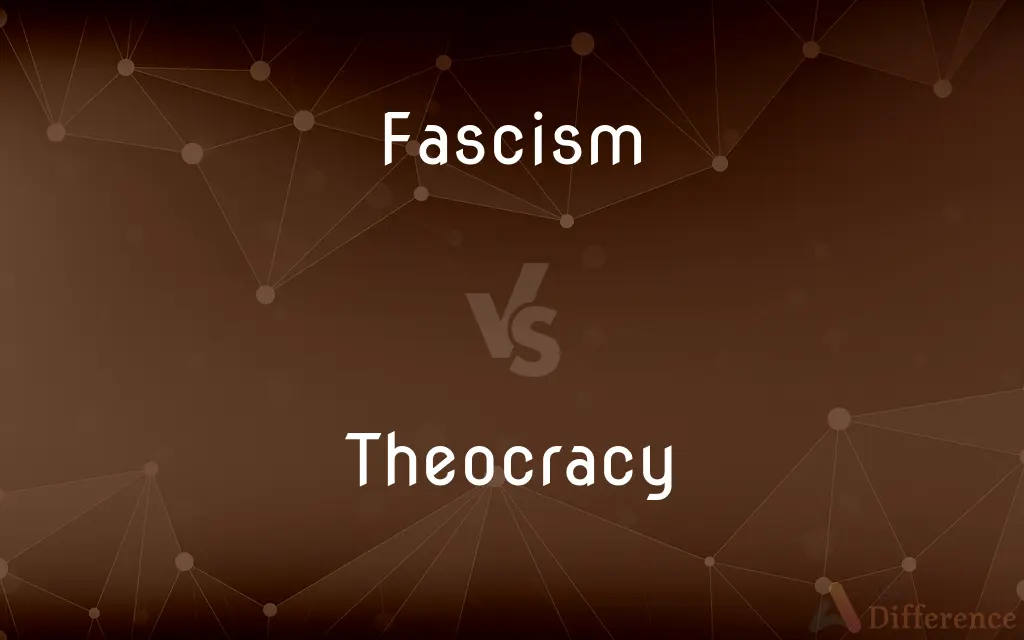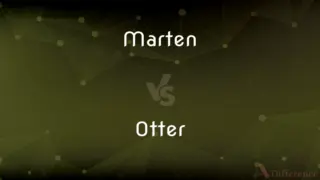Fascism vs. Theocracy — What's the Difference?
By Tayyaba Rehman & Urooj Arif — Updated on April 7, 2024
Fascism is far-right, authoritarian ultranationalism characterized by dictatorial power and suppression of opposition. Theocracy is form of government in which deity is officially recognized as civil ruler, and religious officials govern in deity's name.

Difference Between Fascism and Theocracy
Table of Contents
ADVERTISEMENT
Key Differences
Fascism is a political ideology that emerged in early 20th-century Europe, emphasizing aggressive nationalism, centralized autocratic leadership under a dictatorial ruler, and the suppression of political opposition. Whereas theocracy is a system of government where priests rule in the name of God or a god, making no distinction between religious and political authority.
In fascist regimes, the state's power is consolidated in the hands of a single leader or a ruling party, often utilizing militarism, propaganda, and mass mobilization to maintain control. On the other hand, in theocracies, leadership is typically vested in religious leaders who interpret divine laws as the basis for government, often merging religious law with state law.
Fascism strictly controls all aspects of life, including the economy, education, and the media, with the aim of creating a homogeneous society that aligns with the ruler's or party's ideology. In contrast, theocracy focuses on governing according to religious principles and texts, which can lead to a wide variety of governance models based on different religions' interpretations.
While fascism explicitly rejects democracy, seeing it as weak and corrupt, theocracies may also limit democratic freedoms, such as freedom of religion, speech, and assembly, but they do so in the name of religious adherence rather than national strength or unity.
Despite their differences, both systems can result in the suppression of individual freedoms. Fascist governments suppress dissent to maintain a unified national front, while theocracies suppress activities and beliefs that are deemed heretical or blasphemous to ensure religious purity and obedience.
ADVERTISEMENT
Comparison Chart
Definition
A political ideology focused on authoritarian ultranationalism and dictatorial power.
A form of government where a deity is recognized as the supreme civil ruler, with officials ruling in its name.
Authority Source
Power centralized in a leader or party.
Power derived from religious authority.
Control Over Society
Total control over politics, economy, and culture.
Control based on religious laws and doctrines.
Views on Democracy
Rejects democracy as corrupt and inefficient.
May restrict democratic freedoms in favor of religious law.
Goal
To create a unified, homogeneous state.
To govern according to divine laws and principles.
Compare with Definitions
Fascism
Emphasizes an aggressive nationalistic worldview.
Fascism promoted territorial expansion as a national right.
Theocracy
Seeks to govern according to divine commandments.
The leaders interpreted sacred texts to make policy decisions in the theocracy.
Fascism
Utilizes propaganda and mass media to control public opinion.
The regime used fascism to create a cult of personality around the leader.
Theocracy
Religious law is used as the legal framework.
The theocracy imposed religious laws on all aspects of life.
Fascism
Characterized by dictatorial power and forcible suppression of opposition.
The fascist regime dismantled democratic institutions to consolidate power.
Theocracy
Often involves the merger of religious authority with state power.
Leaders in the theocracy claimed divine right to govern.
Fascism
Advocates for a mixed economy with the state playing a key role.
In fascism, the government controlled key industries to serve national interests.
Theocracy
May restrict religious freedom, enforcing a state religion.
The theocracy persecuted followers of other religions.
Fascism
Political philosophy prioritizing the nation above the individual, with strong central power.
Under fascism, the government suppressed dissent to maintain national unity.
Theocracy
Government system where priests or religious leaders rule in the name of God.
In the theocracy, laws were based on religious texts.
Fascism
A system of government marked by centralization of authority under a dictator, a capitalist economy subject to stringent governmental controls, violent suppression of the opposition, and typically a policy of belligerent nationalism and racism.
Theocracy
Theocracy is a form of government in which a deity of some type is recognized as the supreme ruling authority, giving divine guidance to human intermediaries that manage the day-to-day affairs of the government.The Imperial cult of ancient Rome identified Roman emperors and some members of their families with the divinely sanctioned authority (auctoritas) of the Roman State. The official offer of cultus to a living emperor acknowledged his office and rule as divinely approved and constitutional: his Principate should therefore demonstrate pious respect for traditional Republican deities and mores.
Fascism
A political philosophy or movement based on or advocating such a system of government.
Theocracy
Government ruled by or subject to religious authority.
Fascism
Oppressive, dictatorial control.
Theocracy
Government under the control of a state religion.
The Vatican City State is a Pope.
Fascism
Fascism () is a form of far-right, authoritarian ultranationalism characterized by dictatorial power, forcible suppression of opposition, and strong regimentation of society and of the economy, which came to prominence in early 20th-century Europe. The first fascist movements emerged in Italy during World War I, before spreading to other European countries.
Theocracy
Rule by a god.
Fascism
An authoritarian and nationalistic right-wing system of government and social organization.
Theocracy
Government of a state by the immediate direction or administration of God; hence, the exercise of political authority by priests as representing the Deity.
Fascism
Any right-wing, authoritarian, nationalist ideology characterized by centralized, totalitarian governance, strong regimentation of the economy and society, and repression of criticism or opposition.
Theocracy
A country or state governed in this way.
Fascism
Any system of strong autocracy or oligarchy usually to the extent of bending and breaking the law, race-baiting, and/or violence against largely unarmed populations.
Theocracy
The state thus governed, as the Hebrew commonwealth before it became a kingdom.
Fascism
Any extreme reliance on or enforcement of rules and regulations.
Theocracy
A political unit governed by a deity (or by officials thought to be divinely guided)
Fascism
A political theory advocating an authoritarian hierarchical government; - opposed to democracy and liberalism.
Theocracy
The belief in government by divine guidance
Fascism
An authoritarian system of government under absolute control of a single dictator, allowing no political opposition, forcibly suppressing dissent, and rigidly controlling most industrial and economic activities. Such regimes usually try to achieve popularity by a strongly nationalistic appeal, often mixed with racism.
Fascism
Specifically, the Fascist movement led by Benito Mussolini in Italy from 1922 to 1943.
Fascism
Broadly, a tendency toward or support of a strongly authoritarian or dictatorial control of government or other organizations; - often used pejoratively in this sense.
Fascism
A political theory advocating an authoritarian hierarchical government (as opposed to democracy or liberalism)
Common Curiosities
Are all theocracies inherently undemocratic?
While theocracy often limits some democratic principles like religious freedom, some theocracies may incorporate democratic elements in their governance structures.
Can fascism exist without a strong leader?
Fascism typically revolves around a central figure or party that embodies the state's power, making strong leadership a key component.
Can a government be both fascist and theocratic?
While fundamentally different, a government can exhibit elements of both if a religious ideology becomes closely intertwined with nationalist and authoritarian practices.
What role does religion play in fascist governments?
While not inherently religious, fascist regimes may exploit religious themes for nationalist purposes, but they keep religious institutions under state control.
How do citizens live under a fascist regime compared to a theocracy?
Citizens under fascism face strict state control and suppression of dissent, while in a theocracy, religious laws dictate life, potentially limiting personal freedoms.
Can a theocracy be secular?
By definition, a theocracy is religious in nature, making a secular theocracy a contradiction in terms.
Have there been successful protests against fascist or theocratic regimes?
History has seen successful uprisings and protests against both types of regimes, though these movements often face severe repression.
What's the main difference between fascism and theocracy?
The main difference lies in the source of authority: fascism derives power from the state and a leader, while theocracy bases its authority on a deity and religious laws.
How do people challenge authority in a theocracy?
Challenging authority in a theocracy can be difficult, as dissent may be seen as not only political but also religious disobedience.
Are there modern examples of fascist states?
While pure fascism is less common today, some regimes exhibit fascist-like tendencies in their authoritarian, nationalist practices.
How do fascist and theocratic regimes impact international relations?
Both types of regimes can be isolating internationally, especially if their policies conflict with global norms around human rights and democracy.
How do educational systems differ under fascism and theocracy?
Educational systems under fascism may emphasize nationalism and loyalty to the state, while in theocracies, education often includes religious instruction according to the state religion.
How do fascist governments justify their control over society?
Fascist governments often justify their control by emphasizing the need for national unity, strength, and the suppression of perceived threats to the state's integrity.
How do theocracies view other religions?
Theocratic governments often prioritize the state religion, sometimes to the exclusion or persecution of other religions, depending on their doctrine.
Can a country transition out of fascism or theocracy?
Yes, countries can and have transitioned to other forms of government, often through internal reform or external intervention.
Share Your Discovery

Previous Comparison
Marten vs. Otter
Next Comparison
Gage vs. GaugeAuthor Spotlight
Written by
Tayyaba RehmanTayyaba Rehman is a distinguished writer, currently serving as a primary contributor to askdifference.com. As a researcher in semantics and etymology, Tayyaba's passion for the complexity of languages and their distinctions has found a perfect home on the platform. Tayyaba delves into the intricacies of language, distinguishing between commonly confused words and phrases, thereby providing clarity for readers worldwide.
Co-written by
Urooj ArifUrooj is a skilled content writer at Ask Difference, known for her exceptional ability to simplify complex topics into engaging and informative content. With a passion for research and a flair for clear, concise writing, she consistently delivers articles that resonate with our diverse audience.
















































